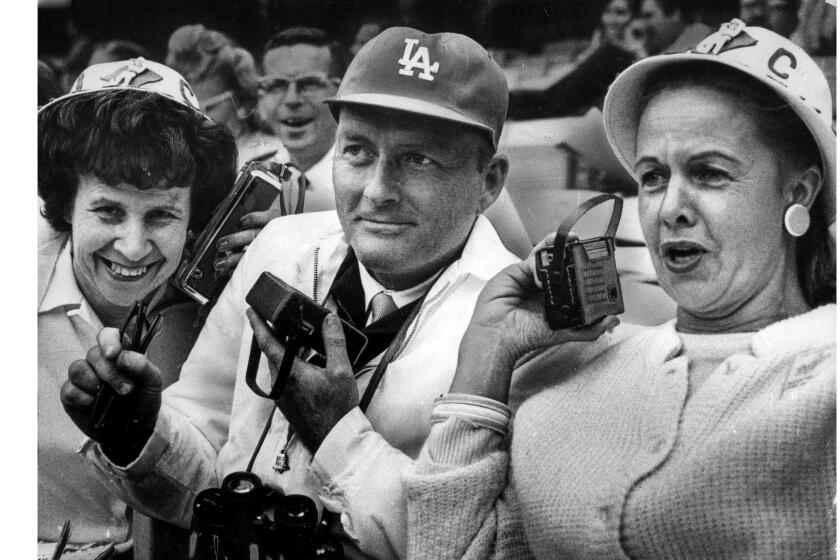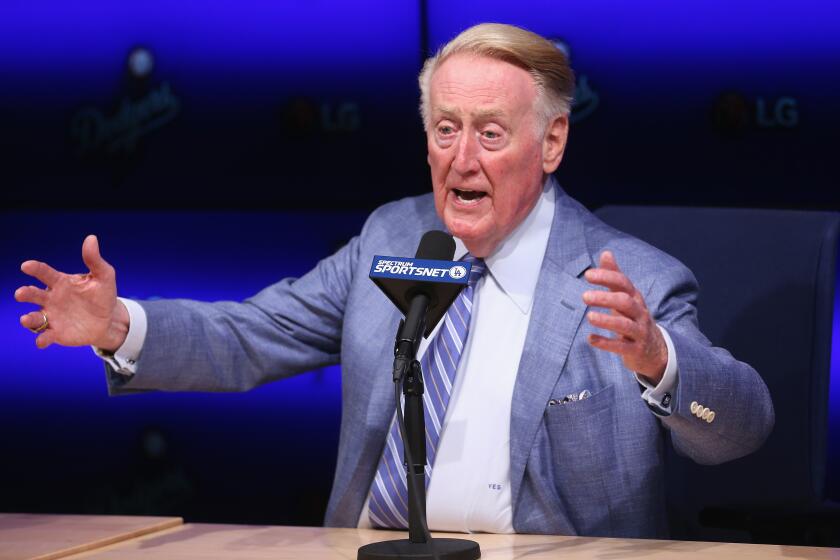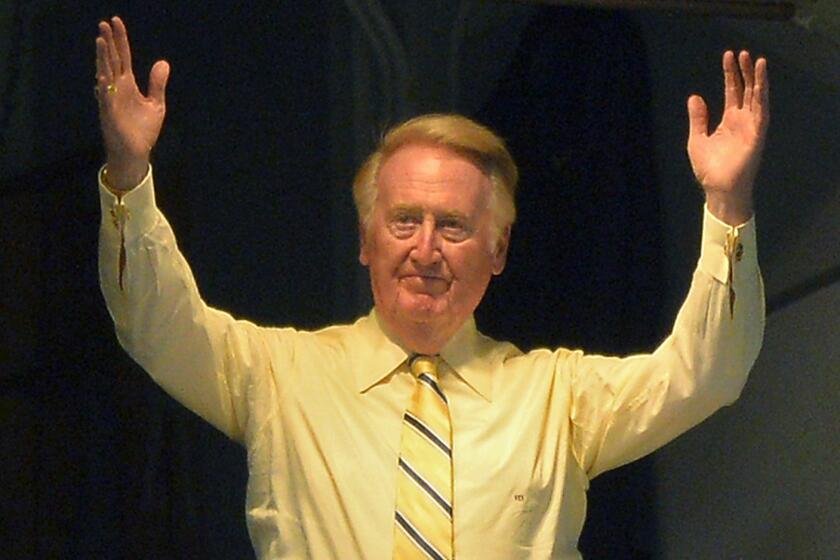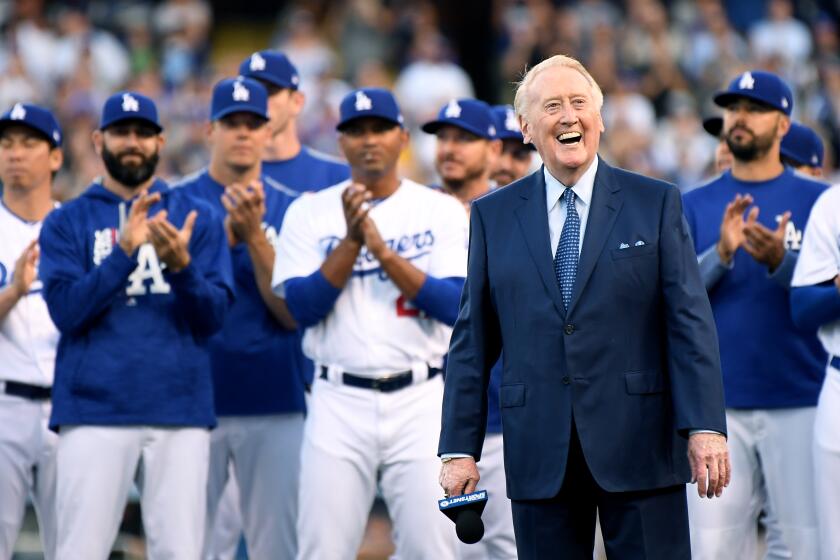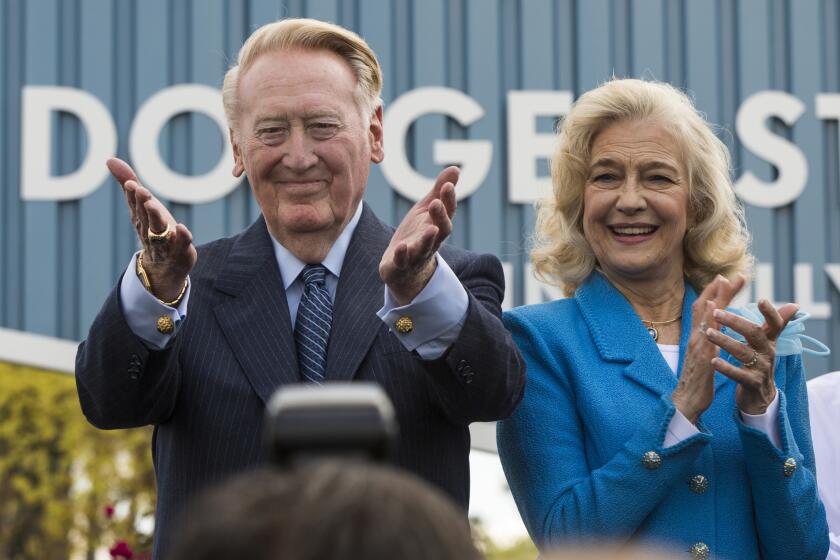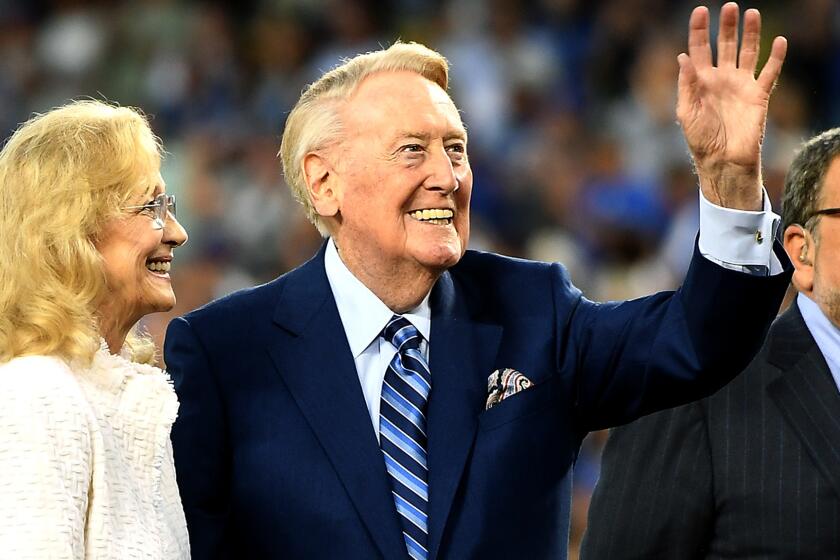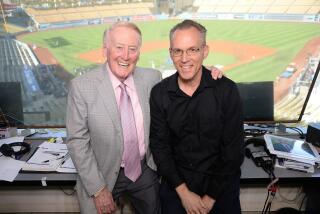Vin Scully, forever the voice of the Dodgers, dies at 94

- Share via
The way Vin Scully called a baseball game, it felt like bumping into an old friend. There were stories to tell and memories to share, his soothing banter as familiar as green grass and warm breezes on a sunny afternoon.
Generations of Southern California fans knew this, listening for hours on end, at home and in their cars, pressing transistor radios to their ears even as they sat watching at the ballpark.
“Hi, everybody, and a very pleasant good afternoon to you wherever you may be,” Scully would invariably begin. “Pull up a chair and spend part of the day with us.”
The renowned Dodgers broadcaster died Tuesday, the team announced. He was 94. The Dodgers said he died at his home in Hidden Hills.
“We have lost an icon,” Dodgers President and CEO Stan Kasten said. “The Dodgers’ Vin Scully was one of the greatest voices in all of sports. He was a giant of a man, not only as a broadcaster, but as a humanitarian. He loved people. He loved life. He loved baseball and the Dodgers. And he loved his family. His voice will always be heard and etched in all of our minds forever.”
It was Scully’s feel for the ebb and flow of the game that made him a Hall of Famer during more than six decades in the booth. He could weave a narrative between balls and strikes, transforming nine innings into a folksy tale, raising even a lowly bloop single to literary status when he called it “a humble thing, but thine own.”
Veteran sports commentator Bob Costas spoke of Scully’s “command of language and quality of expression, the sheer sound of his voice.” The son of Irish immigrants also knew when to keep quiet, letting the roar of the crowd speak for itself.
Add to these traits the gift of longevity, a career that spanned Dodgers history from Jackie Robinson to Clayton Kershaw and included network television stints covering football, tennis and golf. Scully presided over some of baseball’s greatest moments: Sandy Koufax’s perfect game, Kirk Gibson’s World Series heroics and Hank Aaron’s eclipse of the all-time home run record.
As players came and went, the voice of the Dodgers remained a constant, fans voting Scully the most memorable personality in team history.
Born in the Bronx on Nov. 29, 1927, Vincent Edward Scully was only 7 when his father died of pneumonia and his mother moved the family to Brooklyn. Sports ran in his blood.
“We had this big old radio, and I would crawl underneath it, and the speakers would be directly over my head,” he told The Times in 1994. “Something would happen, and the announcer would get excited. The crowd would roar, the sound would come out of that speaker like water out of a showerhead, and it seemed to wash down on me.”
The red-haired boy spent summer days playing stickball in the streets and collecting empty soda bottles, returning them for refunds so that he could buy a 55-cent ticket to the Polo Grounds. His favorite team was the New York Giants, a hated rival of the Brooklyn Dodgers, the team with which he would later become synonymous.
Scully attended Fordham University and played two seasons in center field for the baseball team. His education was interrupted by a tour of duty in the Navy that ran through 1945, after which his love for the game took a different form.
For decades, listening to Vin Scully on a transistor radio became part of the quintessential experience for any fan attending a game at Dodger Stadium.
A stint at his school newspaper and office work for the New York Times led him to a Washington, D.C., radio station after graduation. By 1950, the legendary broadcaster Red Barber had heard him and called to offer a job. As the third man on Dodgers broadcasts behind Barber and Connie Desmond, the 23-year-old newcomer studied his older colleagues.
“Red Barber instilled in me that you always go down the middle,” Scully once said. “I like to think that if I say that somebody made a good catch, the fans will believe me because I will also say so if he butchered the play.”
His apprenticeship lasted only a few years before Barber jumped to the New York Yankees. Scully took over in 1954 and, a year later, called the franchise’s first World Series victory, telling listeners simply, “The Brooklyn Dodgers are the champions of the world,” before falling silent.
In truth, his emotions had gotten the best of him — he felt closer to the players in those days and was afraid his voice might crack if he uttered another word — but that sense of reserve became a trademark.
By the fall of 1957, Dodgers owner Walter O’Malley had reached an impasse with New York officials over building a new stadium. The team known as “Dem Bums” packed up and moved to Los Angeles.
Back then, Scully spoke in a slightly higher pitch, his words quicker. It would take a few years for this cadence to slow to a rhythm that fit Southern California’s less hurried pace, his voice growing ever more melodic. Fans became accustomed to the announcer with the neatly combed hair and pressed blazer, the man whom late Times columnist Jim Murray dubbed “the Fordham Thrush with the .400 larynx.”
Working alone for much of his career, Scully could spread an anecdote across several pitches, batters even, without a hitch. And he never relied on catchphrases to punctuate critical moments.
There were times when he sounded a bit hackneyed, instilling ordinary moments with great drama. And his factoids — overlooked statistics and historical notes — sometimes ventured south of esoteric.
Old-school baseball bard Vin Scully, 92, is hoping to reconnect with L.A. fans via Twitter, Instagram and Facebook, Bill Plaschke writes.
Scully also drew occasional criticism. The night before the 1981 baseball strike, he chose not to mention that players were walking out. Years later, second baseman Jeff Kent bristled when Scully mentioned that he was hitting better with Manny Ramirez in the lineup.
“Vin Scully talks too much,” Kent said.
Listeners and peers seemed to forgive any such indulgences.
“Vin Scully speaks more words than any other broadcaster, but he’s entitled to,” Costas said in 2009. “He speaks them so well.”
The Dodgers needed every syllable when they arrived from Brooklyn. The 1958 roster featured name players such as Pee Wee Reese and Duke Snider, as well as up-and-coming pitchers Koufax and Don Drysdale, but the team wasn’t very good, finishing next to last.
To make matters worse, Dodger Stadium had yet to open, so fans were forced to watch baseball in the football-oriented L.A. Memorial Coliseum. Sitting 79 rows up, they needed those transistor radios to make sense of the action on the field.
That is when Scully put his stories and curious tidbits to best use, walking a thin line by entertaining without distracting from the game.
His words radiated across Southern California’s car culture by way of dashboard radios, making the team’s flagship station a ratings winner each season. Television began airing a few Dodgers-Giants games from San Francisco, drawing a viewership that rivaled the top show, “Bonanza.”
“It may sound corny,” Koufax once said, “but I enjoyed listening to Vin call a game almost more than playing in them.”
As Scully became the soundtrack of summer for so many, he provided a string of unforgettable moments, none bigger than Koufax’s historic performance in 1965.
With the Dodgers playing the Chicago Cubs, the Hall of Fame pitcher headed to the mound in the ninth inning just three outs shy of a perfect game. Scully called it “the toughest walk of his career, I’m sure.” Two masterpieces ensued — one on the field and one in the booth.
The legendary Dodgers announcer outlasts 127 other entrants in a tournament to decide the biggest icon in L.A. sports history.
As Koufax worked his way through the inning, pitch by pitch, Scully provided a spellbinding account. No detail escaped the announcer’s eye: Koufax hitching up his belt and mopping his brow, the other Dodgers pitchers pressing against the bullpen fence to watch, fans hollering for a strike every time.
“There’s 29,000 people in the ballpark and a million butterflies,” Scully said, adding later: “A lot of people in the ballpark now are starting to see the pitches with their hearts.”
When the Cubs’ Harvey Kuenn swung and missed for the final out, listeners heard only the fans’ cheering for more than 30 seconds before Scully noted: “On the scoreboard in right field it is 9:46 p.m. in the City of Angels, Los Angeles, California.”
“It was like a perfect essay composed on the spot, off the top of his head,” Costas said.
In 1974, Scully called Aaron’s record-setting 715th home run in Atlanta. In Game 1 of the 1988 World Series against the Oakland Athletics, he sat behind the microphone as an injury-hobbled Gibson slammed a ninth-inning home run that propelled the upstart Dodgers to the championship.
“She is gone!” Scully said as the ball sailed over the right-field wall. “In a year that has been so improbable, the impossible has happened.”
But perhaps the truest measure of the man’s talent emerged in less glamorous moments as he carried listeners through the dog days of summer.
Fans came to trust him when the team struggled and he wasn’t afraid to say so. After television took over, his broadcasts retained a familiar tenor; belonging to a generation before instant replay, he still used his words to paint a picture. Every game included shots of children in the stands. Every at-bat, it seems, prompted a quip.
Talking about an opposing player, Scully once said: “Andre Dawson has a bruised knee and is listed as day-to-day. … Aren’t we all?”
Describing the great Bob Gibson, who worked fast on the mound, Scully noted: “He pitches as though he’s double-parked.”
During a mediocre season in 1990, he said: “The Dodgers are such a .500 team that if there was a way to split a three-game series, they’d find it.”
Despite his fame in Los Angeles — a city enamored with celebrity — Scully never sought attention for himself. The Dodgers needed him to make personal appearances to woo fans in those first years on the West Coast, but after that he became increasingly private.
When the Yankees called in the 1960s, offering him a higher-profile job with a marquee franchise, he chose not to uproot his family. As he once said: “I guess I have what they call the nesting urge.”
Home life was devoted to children and grandchildren and a reading list that included James Michener as well as books about famous court trials.
A look back at the life of prolific Dodgers announcer Vin Scully, who worked 67 seasons in the broadcast booth for the team before retiring in 2016.
“I’m certainly not an intellectual,” he said. “I just have a fairly curious mind.”
Stereo speakers piped music throughout the house, Scully often whistling or singing along to Broadway hits. His second wife, Sandi, said: “Then he gets into the car on the drive to work and really sings.”
The separation between home and baseball worked both ways as Scully kept his personal life out of the broadcast booth. Fans rarely heard about his hardships, at least not from him.
There was the death of his first wife, Joan, in 1972. The coroner ruled that the former New York model had succumbed to an accidental overdose of cold and bronchitis medication. Left with three children, Scully soon married Sandi, who was working as a secretary for the Rams, and their family grew to six children.
Tragedy struck again in 1994. Michael Scully, the eldest son, was working as an oil company engineer, checking for pipeline damage in Central California, when his helicopter hit unmarked power lines. Hours after his death, Michael’s wife gave birth to a son, forcing Scully to alternately visit the newborn grandchild and pick out a casket.
“To lose a son, there is no way you can ever imagine. ... Even to this day, it is so overwhelming that you can’t get a grip on it,” he said in 1998. “But that is where your work will help you. For a couple of hours a day, you can work through it.”
By then, the whole country knew of Scully from network television. He called Major League Baseball’s “Game of the Week,” various All-Star games and golf tournaments from the mid-1970s through the ’80s. On the radio, he was at every World Series through much of the 1990s.
There was also a stint announcing pro football games — the sport’s quicker pace did not suit his best attributes — and appearances in several movies, including “For Love of the Game” with Kevin Costner. Costas was interviewing Ray Charles when the singer made an off-camera request: He wanted to meet the Dodgers’ play-by-play man.
“His broadcasts are almost musical,” Costas recalls Charles saying. “The sound is what matters to me.”
Sandra Scully’s perfect partnership with Vin Scully, her husband of 47 years, resonates as well as her devotion to her large brood of children and grandchildren.
Several years passed before Costas got the men together for a television interview. Scully talked about Charles’ recording of “Born to Lose,” and Charles mentioned several of the announcer’s famous broadcasts.
“I think that Vin was very happy to meet Ray,” Costas recalled. “But Ray was over the moon. Like a kid meeting his favorite ballplayer.”
It was a golden age for sports announcers in Southern California. Chick Hearn was forging his own renowned career with the Lakers. Dick Enberg called Angels games, and Bob Miller would become a Hall of Fame hockey announcer with the Kings. Even in this company, Scully stood out.
The baseball Hall of Fame inducted him into its broadcasters’ wing in 1982, the same year he got a star on the Hollywood Walk of Fame. He was named national sportscaster of the year four times and earned an Emmy Award for lifetime achievement. In 2009, his peers in the American Sportscasters Assn. voted him above the likes of Barber, Mel Allen and Curt Gowdy as the top sportscaster of all time.
“Whenever I call the Dodgers, I ask to be put on hold,” then-Major League Baseball commissioner Bud Selig told the Washington Post in 2005. “And when they ask why, I say, ‘Because I want to hear Scully for a few minutes.’ ”
The final seasons of his long career were marked by a reduced schedule as he stopped traveling to games east of the Rocky Mountains. When the Dodgers played at home, there were a few innings on a television-radio simulcast, the rest of the game spent with the TV audience.
Working on a string of one-year contracts, Scully eventually announced that the 2016 season would be his last. In his final home game, the players agreed on a plan, looking up to the broadcast booth before each at-bat and tipping their caps. It took an inning before Scully noticed and began waving back. The game ended fittingly.
Legendary Dodgers announcer Vin Scully says the coronavirus outbreak is unlike anything he’s ever seen, but he finds hope in a time of despair.
“Swung on and a high drive to deep left field, the Dodger bench empties,” Scully intoned as reserve infielder Charlie Culberson hit the game-winner. “Would you believe a home run? And the Dodgers clinch the division and will celebrate on schedule.”
Then he remained silent for a full minute.
Retirement afforded more time to spend with Sandi — who died of ALS complications in January 2021 — and all those grandchildren. Social media allowed him to share his thoughts and memories. He posted a photograph showing off the 2020 World Series ring that the team gave to him.
In an interview with Times columnist Bill Plaschke, Scully spoke of the hardships posed by the coronavirus pandemic.
We asked for your memories of legendary Dodgers broadcaster Vin Scully and received hundreds of responses. Here is what some readers had to say:
“From depths of Depression we fought our way through World War II, and if we can do that, we can certainly fight through this,” he said. “I remember how happy and relieved and thrilled everybody was … when they signed the treaty with Japan, and the country just danced from one way or another. It’s the life of the world, the ups and downs; this is a down, we’re going to have to realistically accept it at what it is and we’ll get out of it, that’s all there is to it, we will definitely get out of it.”
Over the last few years, Scully made infrequent public appearances. More often, that familiar voice rang through Dodger Stadium in prerecorded promos and videos. But it was never the same as having him at the ballpark on a bright, clear afternoon.
More to Read
Start your day right
Sign up for Essential California for the L.A. Times biggest news, features and recommendations in your inbox six days a week.
You may occasionally receive promotional content from the Los Angeles Times.

